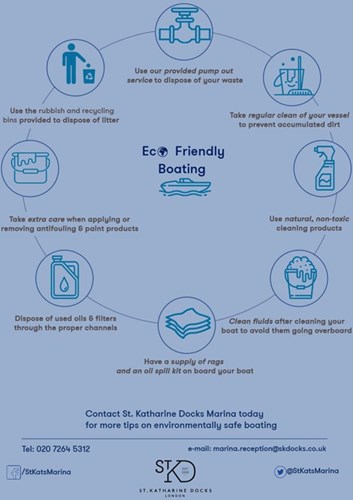Does Recreational Boating Affect the Environment?
Owning a boat is a highly-valued recreational activity and no one should be denied a fun and relaxing day on a boat. However, environmentally conscious boaters should always bear in mind that some of the activities associated with their boats, may have severe unintentional or unexpected impacts on the marine environment.
We've been hearing a lot about environmental pollution lately, and the facts don't look good. Many of us are looking for ways to change to our day-to-day behaviours to help make a difference, but, knowing the what's and how's is difficult. St. Katharine Docks Marina acknowledges that, increasing users' consciousness and awareness about the appropriate behaviours, is key for minimizing the environmental impact.
So, as regular boat users, what can we actually do? We have put together a short list of suggestions to help you become a greener marina user and maintain our marina in a cleaner and safer condition for both humans and the wildlife.
Pump Outs
Sewage increases the number of harmful bacteria in a water space. Aside from the smell and risk of spreading diseases, as a result of the bacteria, oxygen levels drop, affecting the species that rely on it for survival. You are requested not to dispose any waste water into the marina. Pump outs, operated by the marina staff, are available at almost every berth. Times and charges should be discussed with our Marina Reception.
Cleaning Products
Chemical substances contained in cleaning products, significantly alter the water composition and function as a nourishing element for aerating water flora to develop. When algae die, bacteria are generated, which deplete the level of oxygen in water. You are requested to take regular cleaning care of your vessel, and ensure you are using natural and non-toxic products to avoid this. Additionally, waxing fiberglass is suggested to prevent dirt from accumulating and thus eliminates the need for harsh detergents. Fluids should be immediately cleaned after cleaning your vessel, to avoid them going overboard.
Oil & Fuel Spills
During an oil spill, oil and engine fuels float on the water surface, blocking the sunlight from entering the water, affecting plants need for photosynthesis. It can also be extremely harmful for bird species when ingested, it penetrates their feathers, restricting flight and movements, and limits respiration. Having a supply of rags on board to clean up oil and fuel spills as soon as they occur, will help minimize the risk of marine ecosystem contamination. You are also required to dispose of used oil and filters through the proper channels and keep a supply of rags and oil spill kits on board.
Antifoul & Paint
Coating the hull of your boat can significantly improve its performance and durability. However, extra care should be taken when applying or removing these products, which are toxic and can have a severe impact on the marine biodiversity.
A decrease in water quality would be damaging to both wildlife and humans. Aquatic plants and animals have specific requirements for light, temperature, pH levels and oxygen. Humans could also be impaired if the toxins in anti-fouling paints and cleaning products are absorbed by the skin and the eyes. Therefore, maintaining your boat is vital, not only to increase the lifespan of your vessel, but also to protect the environment and keep our marina shipshape.
To book your berth at St. Katharine Docks please click HERE
